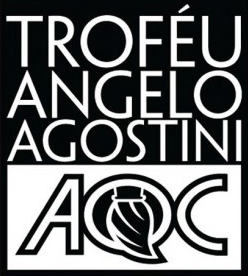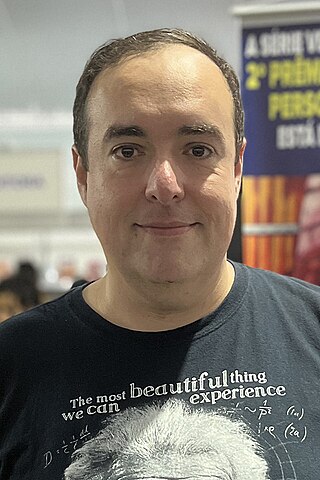Related Research Articles

Festival Internacional de Quadrinhos (FIQ) is a comic convention held in Belo Horizonte, Brazil, every two years.

Brazilian comics started in the 19th century, adopting a satirical style known as cartoon, charges or caricature that would later be cemented in the popular comic strips. The publication of magazines dedicated exclusively to comics, in Brazil, started at the beginning of the 20th century. Brazilian artists have worked with both styles. In the case of American comics some have achieved international fame, like Roger Cruz with X-Men and Mike Deodato with Thor, Wonder Woman and others.

André Diniz is a Brazilian comics artist. He began working with comics in 1994 with the fanzine Grandes Enigmas da Humanidade, which had a circulation of 5,000 copies.

Prêmio Angelo Agostini, sometimes also called Troféu Angelo Agostini, is the most traditional comics award in Brazil. It was created in 1985 by the Associação dos Quadrinhistas e Caricaturistas do Estado de São Paulo (AQC-ESP), which still organizes the event today.
Universo HQ is a Brazilian website about comics and considered the most important Brazilian information source on comics-related news.

André Luiz da Silva Pereira, well known as André Vazzios is a Brazilian colorist, comics artist and architect. Graduated in Architecture from Mackenzie Presbyterian University, he began his career as an illustrator in 1995 at the Abril Jovem publishing house.
Franco de Rosa is a Brazilian journalist, editor and comics artist. He started his career in 1974, with the comic strips Chucrutz and Capitão Caatinga, published in some Brazilian newspapers, such as Notícias Populares. From 1980, he started to make illustrations for newspapers and magazines. In 1984 he founded, alongside Paulo Paiva, the publishing house Maciota, which lasted until the 1990s. In 1997, he founded, alongside Dorival Vitor Lopes and Hélcio de Carvalho, the publishing house Mythos Editora. Rosa won the Troféu Jayme Cortez in 1990 and 1991, the Prêmio Angelo Agostini as best editor in 2003 and 2004 and as "Master of the National Comics" category in 2010.

Lucio Luiz is a Brazilian journalist, writer, editor, podcaster and comics author. He holds a degree in Journalism and has Master's degree and Doctorate in Education.

Master of National Comics is one of the categories of Prêmio Angelo Agostini, the most traditional Brazilian award dedicated to comics that has been held since 1985 by Associação dos Quadrinhistas e Caricaturistas do Estado de São Paulo (AQC-ESP).

Manoel Messias de Mello, better known as Messias de Mello, was a Brazilian illustrator and painter. Born in Alagoas, he moved to São Paulo in the 1930s. He started working as designer of posters and shop windows, until he got a job as an illustrator at Gazeta Juvenil, a children's supplement for the newspaper A Gazeta.
Rodolfo Zalla was an Argentine comics artist. He started drawing comics while still in Argentina in 1953, but his career gained prominence after moving to Brazil with fellow comic artist José Delbo in 1963. He started producing comic strips of characters such as Targo, O Vingador and O Escorpião. He has worked for several comic book publishers and has produced stories in various genres, such as war and terror. He also produced Disney Comics about Zorro for editora Abril. In 1985, he was awarded the Prêmio Angelo Agostini for Master of National Comics, an award that aims to honor artists who have dedicated themselves to Brazilian comics for at least 25 years. He remained active drawing comics until his death in 2016, at 84 years old.
Flavio Colin was a Brazilian comic artist and illustrator, considered one of the most important comic artists in Brazil. He began his career in the 1950s with an adaptation for the comic book radio series As Aventuras do Anjo, influenced by Milton Caniff, but began to gain prominence with the development of his own stylized artist style. In 1987, he was awarded with the Prêmio Angelo Agostini for Master of National Comics, an award that aims to honor artists who have dedicated themselves to Brazilian comics for at least 25 years. He also won the Troféu HQ Mix in 1994 and 1995. Flávio Colin died in Rio de Janeiro on 2002.
Ely Barbosa was a Brazilian comics artist. He started working with comics in the early 1970s with his studio, which produced the Os Trapalhões comic book for Bloch publishing house. In 1976, he released his own characters: Turma da Fofura and Turma do Cacá, initially in children's books, but which, with their success, quickly gained comics, first by the publisher RGE and later by the editora Abril. In the 1980s, new characters emerged, such as Amendoins, Gordo and Patrícia, all with their own comic books, which were published until 1992. Barbosa also produced animations and TV commercials, plays and children's television series with his characters, such as Tutti-Frutti and Boa Noite, Amiguinhos in the 1980s and Fofura na TV, in the 1990s. In 1994, he was awarded with the Prêmio Angelo Agostini for Master of National Comics, an award that aims to honor artists who have dedicated themselves to Brazilian comics for at least 25 years.
Edson Rontani was a Brazilian illustrator and fanzine editor, known for having created the first Brazilian fanzine about comics.
Ivan Wasth Rodrigues was a Brazilian painter and comics artist. He learned painting at the ateliers of José Wasth Rodrigues, Cid Affonso Rodrigues and Vittorio Gobbis, and also at the Escola de Belas-Artes de São Paulo. He started his professional career as a book illustrator for the Melhoramentos publishing house and doing advertising design. In the field of comics, he designed a two-part book for EBAL publishing house on the history of Brazil and the adaptation of the classic Casa-Grande & Senzala, by Gilberto Freire. For Freire's book, which talks about the period of slavery in Brazil, Wasth Rodrigues researched for five months the paintings of Jean-Baptiste Debret. In 2001, he was awarded with the Prêmio Angelo Agostini for Master of National Comics, an award that aims to honor artists who have dedicated themselves to Brazilian comics for at least 25 years.
Flavio Soares is a Brazilian comics artist.

Itiban Comic Shop is a Brazilian comic book store founded in 1989 by the couple Mitie Taketani and Francisco Utrabo in Curitiba. It was the first bookstore specializing in comics in the Brazilian South Region and one of the pioneers in Brazil. The name references the Japanese word "ichiban" (一番), meaning "number 1".
Bigorna was a Brazilian website about comics with an almost exclusive focus on Brazilian comics.

Mariana Cagnin, better known as Mary Cagnin is a Brazilian comic artist.
References
- ↑ "Comix Book Shop comemora 22 anos em outubro" (in Portuguese). Universo HQ. October 27, 2008.
- 1 2 3 "O poderoso mercado nerd" (in Portuguese). Pequenas Empresas & Grandes Negócios. February 2010.
- 1 2 3 4 "A família que comanda a Fest Comix" (in Portuguese). O Estado de S. Paulo. October 19, 2012.
- ↑ "Público lota Bienal do Livro do Rio atrás de promoções e best-sellers" (in Portuguese). Folha de S.Paulo. May 16, 2005.
- ↑ "Confins do Universo 128 – Os desafios de vender quadrinhos no Brasil" (in Portuguese). Universo HQ. April 28, 2021.
- ↑ "Quando gibis são feitos com amor" (in Portuguese). Tribuna do Paraná. February 16, 2003. Archived from the original on December 27, 2021. Retrieved March 21, 2022.
- ↑ "Revista Comix Book Shop está de volta" (in Portuguese). Universo HQ. June 10, 2003.
- ↑ "Comix realiza 1ª Fest Comix, dia 9 de setembro" (in Portuguese). Universo HQ. December 1, 2001.
- ↑ "Comix Book Shop inaugura seu novo endereço no dia 12 de março" (in Portuguese). "Universo HQ". March 11, 2022.
- ↑ "Divulgados os vencedores do Troféu Angelo Agostini" (in Portuguese). Universo HQ. January 23, 2003.